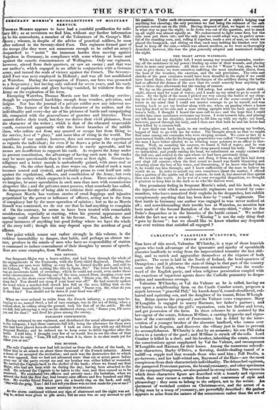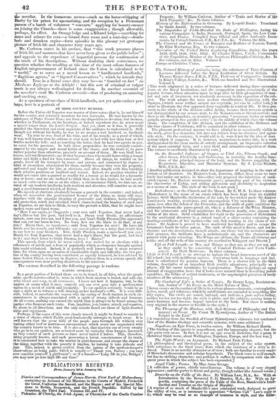CARLETON'S VALENTINE M'CLUTCHY, THE IRISH AGENT.
THE hero of this novel, Valentine M'Clutchy, is a type of those knavish agents who took advantage of the ignorance and apathy of spendthrift absentee landlords to wring from the impoverished tenantry the last shil-
, and to enrich mid aggrandize themselves at the expense of both parties. The scene is laid in the North of Ireland, the head-quarters of Orangeism ' • and it pictures the state of things in that part of the country soon after the Union, when "Protestant ascendancy" was the watch- word of the English party, and when religious persecution coupled with the exactions of rapacious agents drove the Catholic peasantry to despe- ration and murderous revenge.
Valentine M‘Clutchy, or Val the Vulture as he is called, having an eye upon a neighbouring farm on the Castle Cumber estate, proposes a match between "graceful Phil," his knock-knee'd, round-shouldered, red- haired and squinting son, and the daughter of its tenant, Brian APLough lin. Brian spurns the proposal ; and the Vulture vows vengeance. Mary APLoughlin is engaged to marry Harman, her father's partner • and APClutchy tries to blast the girl's reputation rain her father and lover, and get possession of the farm. In these schemes he is assisted by the law-agent of the estate, Solomon DPSlime, a canting hypocrite and repro- bate of the conventicle sect of Protestants ; but is foiled by the inter- vention of a younger brother of the absentee landlord, who comes over to Ireland in disguise, and discovers the villauy just in time to prevent its accomplishment. APClutchy is shot by an assassin ; his son Phil sinks down to a turnkey of the gaol ; and APSlime is struck off the rolls. Lord Cumber is killed in a duel; and his brother, inheriting the estate, restores the conscientious agent supplanted by Val the Vulture, and recompenses APLoughlin and Harman for their losses. Among the numerous subordi- nate characters, Darby O'Drive, a fawning, double-dealing rascal of a bailiff—a supple tool that wounds those who used him' Poll Doolin, go-between ; and her half-witted son, Raymond of the Hats—are the most conspicuous from their characteristic individuality. The debauched squireen, the pampered Protestant parson, the brutal yeomanry, and other specimens of the rampant Orangemen, are also painted in strong colours. The scenes in. which these characters figure are described with a homely and vigorous truth, that may excuse a certain freedom and coarseness of style and phraseology : they seem to belong to the subject, not to the writer. An ejectment of wretched eottiers on Christmas-eve, and the arrest of a dying man by a troop of yeomanry, are powerfully, described : the pathos appears to arise from the nature of the occurrences rather than the art or gte neivelist. In the -humorous seenes--such- as the horse-whipping- of Darby by his priest for apostatizing, and the reception by a Protestant parson of a batch of volunteer "converts" applying for bounty-money on joining the Church—there is some exaggeration • though allowable, perhaps, for effect. An Orange lodge and a Riband exaggeration; for
arms and seizure for rent—a Grand Jury room and a rent-day—death- beds and drunken orgies—form episodes in this gloomy yet grotesque picture of Irish life and character forty years ago. • - Mr. Carleton states in his preface, that "this work presents phases of Irish life and manners that have never been given to the public before" ; and appeals to the experience of impartial persons for confirmation of the truth of his descriptions. Without doubting their correctness, we question whether the recalling at this time of the most odious features of English misgovernment of Ireland since the Union is calculated to be "useful," or to serve as a moral lesson to "hardhearted landlords," "flagitious agents," or " bigoted Conservatives " ; which lie intends they should. True in a literal sense they may be—as 'founded on fact" as Madame Lafarge at the Adelphi : but this sort of criminal or vulgar truth is not always well-adapted for fiction. In another essential of the novelist's craft Mr. Carleton succeeds—that of producing an amusing and exciting story.
As a specimen of one class of Irish landlords, not yet quite extinct per- haps, here is a portrait of
AN IRISH COUNTY MEMBER.
Before the Union old Topertoe was master of three votes; that is, he sat himself for the county, and returned members for two boroughs. He was known by the sobriquet of Pater Noster Tom; not from any disposition to devotion, but because, whether in Parliament, on the hustings, or indeed anywhere else, he never made a speech longer than the Lord's Prayer. And yet, short as it was it generally Ousted the 'shrewdest and most sagacious of his audience to understand it. Still, though not without his faults, lie was by no means a bad landlord, as landlords went. 'Tis true he was fond of his wine, and of his wench: as a proof of which, it was well known that he seldom or ever went to bed with less than four or five bottles under his belt: and as touching the latter, that he had two agents in pay, to cater for his passions. In both these propensities he was certainly counte- nanced by the usages and moral habits of the times; and the truth is, he grew rather popular than otherwise, precisely on account of them. He was bluff, bois- terous, and not ill-natured; one of that bygone class who would horse-whip a tenant today and light a duel for him tomorrow. Above all things he resided on his estate, knew all his tenantry by name and person and contracted by degrees a kind of anomalous attachment for them, merely because they were his property, and voted and fought for him at elections, and often fought with him touching their relative positions as landlord and tenant. Indeed, we question whether he would not enter into a quarrel as readily for a tenant as he would for a favourite dog or horse; and we are inclined to tlunk that, to do him justice, he laid nearly as much value on the one as on the other: a circumstance which, we dare say, se- veral of our modern landlords, both resident and absentee, will consider as on our part a good-humoured stretch of fiction. . His speech at elections absolutely 'became a proverb in the country: and indeed, When we remember the good-matured licence of the times, as many still may, tegether with the singular blending of generosity and violence, horse-whipping aid protection, mirth and mischief, which characterized the bearing of such men as Topertoe, we are fain to think, to vary the proverb a little, that he might have spoken more and fared worse.
"Here I am again, ye Wagger& ; your own mild Topertoe, that never had a clay's illness but the gout, bad luck to it. Damn your bloods, ye affectionate rascals, sure you love me, and I love you, and 'tisn't Gully Preston (his opponent) that can cut our loves in two. No boys, he's not the blade to do that at any rate! Bursa then, ye vagaboness mild Tom Topertoe for ever! He loves his bottle and his wench, and will make any rascal quiver on a daisy that would dare to say bow to your blankets. Now, Gully Preston, make a speech—if you can ! Bursa for Tom Topertoe, that never had a day's illness but the gout, bad luck to it ! and don't listen to Gully Preston, boys ! Burnt!"
This speech, from which he never varied, was waited for at elections with a saftiemence of mirth and a force of popularity which no eloquence brought against him could withstand. Indeed, it is perfectly well known that it alone returned him; for when, upon an occasion of considerable doubt and difficulty, the two par- ties of the county haying been considered as equally balanced, he was advised by some foolish friend, or enemy in disguise, to address them in a serious speech, the consequences were near proving disastrous to his interests.
The custom described in the following passage is curious. •
EATING SPOILEEN.
In a great portion of Ireland there are to be found, in all fairs, what the people tam spolleen-tents—that is, tents in which fresh mutton is boiled, and sold out, with bread and soup, to all customers. I know not how it happens, but, be the motive or cause what it may, scarcely any one ever goes into a spoileen-tent *ass in a mood of mirth and jocularity. To eat spoileen seriously, would be as rare a sight as to witness at wife dancing on her husband's coffin. It is very dill- cult, indeed, to ascertain the reason why the eating of fresh mutton in such cir- cumstances is always associated with a spirit of strong ridicule and humour. At all events, nothing can exceed the mirth that is always to be found among the parties who frequent such tents. Fun, laughter, jest, banter, attack and repartee, fly about in all directions, and the only sounds heard are those of light-hearted muse and enjoyment.
Perhaps, if the cause of this were closely traced, it might be found to consist in a'sense of shame' which Paddy good-Inunouredly attempts to laugh away. It is well known that the great body of the people pass through life with-out ever tasting either beef or mutton—a circumstance which every one acquainted with the country knows to be true. It is also a fact, that nineteen out of every twenty who go in to eat spoileen, are actuated more by curiosity than hunger, inasmuch at they consist of such persons as have never tasted it before. This, therefore being generally known, and each possessing a latent consciousness of its truth, it is considwred best to take the matter in good-humour, and escape the shame of the thing together with the poverty it implies, by turning it into ridicule and jest. Tills, indeed, is pretty evident from the nature of the spoileen-keeper's observations on being paid; which is usually—" Thank you, Barney ; you may now consider yourself a guitleinan"; or, if a female—" Long life to you, Bridget ; you may now go into high life any time."



























 Previous page
Previous page